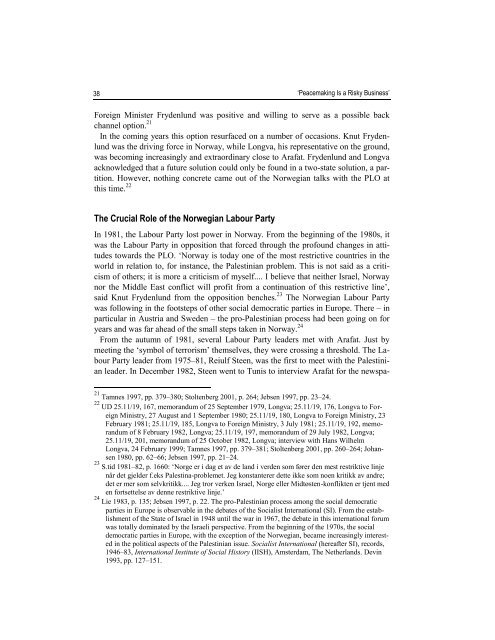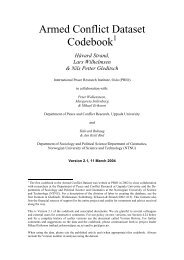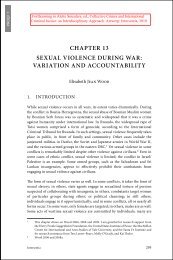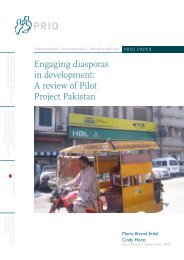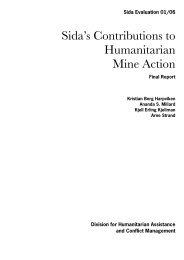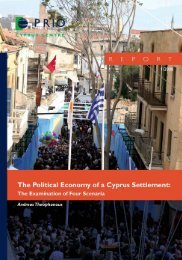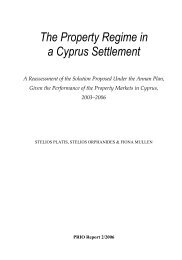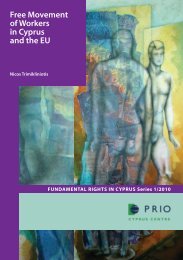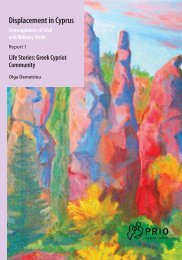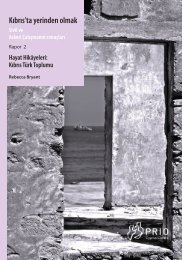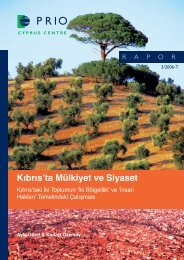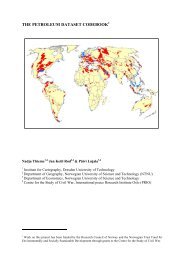Peacemaking Is a Risky Business - PRIO
Peacemaking Is a Risky Business - PRIO
Peacemaking Is a Risky Business - PRIO
Create successful ePaper yourself
Turn your PDF publications into a flip-book with our unique Google optimized e-Paper software.
38 ‘<strong>Peacemaking</strong> <strong>Is</strong> a <strong>Risky</strong> <strong>Business</strong>’Foreign Minister Frydenlund was positive and willing to serve as a possible backchannel option. 21In the coming years this option resurfaced on a number of occasions. Knut Frydenlundwas the driving force in Norway, while Longva, his representative on the ground,was becoming increasingly and extraordinary close to Arafat. Frydenlund and Longvaacknowledged that a future solution could only be found in a two-state solution, a partition.However, nothing concrete came out of the Norwegian talks with the PLO atthis time. 22The Crucial Role of the Norwegian Labour PartyIn 1981, the Labour Party lost power in Norway. From the beginning of the 1980s, itwas the Labour Party in opposition that forced through the profound changes in attitudestowards the PLO. ‘Norway is today one of the most restrictive countries in theworld in relation to, for instance, the Palestinian problem. This is not said as a criticismof others; it is more a criticism of myself.... I believe that neither <strong>Is</strong>rael, Norwaynor the Middle East conflict will profit from a continuation of this restrictive line’,said Knut Frydenlund from the opposition benches. 23 The Norwegian Labour Partywas following in the footsteps of other social democratic parties in Europe. There – inparticular in Austria and Sweden – the pro-Palestinian process had been going on foryears and was far ahead of the small steps taken in Norway. 24From the autumn of 1981, several Labour Party leaders met with Arafat. Just bymeeting the ‘symbol of terrorism’ themselves, they were crossing a threshold. The LabourParty leader from 1975–81, Reiulf Steen, was the first to meet with the Palestinianleader. In December 1982, Steen went to Tunis to interview Arafat for the newspa-21 Tamnes 1997, pp. 379–380; Stoltenberg 2001, p. 264; Jebsen 1997, pp. 23–24.22 UD 25.11/19, 167, memorandum of 25 September 1979, Longva; 25.11/19, 176, Longva to ForeignMinistry, 27 August and 1 September 1980; 25.11/19, 180, Longva to Foreign Ministry, 23February 1981; 25.11/19, 185, Longva to Foreign Ministry, 3 July 1981; 25.11/19, 192, memorandumof 8 February 1982, Longva; 25.11/19, 197, memorandum of 29 July 1982, Longva;25.11/19, 201, memorandum of 25 October 1982, Longva; interview with Hans WilhelmLongva, 24 February 1999; Tamnes 1997, pp. 379–381; Stoltenberg 2001, pp. 260–264; Johansen1980, pp. 62–66; Jebsen 1997, pp. 21–24.23 S.tid 1981–82, p. 1660: ‘Norge er i dag et av de land i verden som fører den mest restriktive linjenår det gjelder f.eks Palestina-problemet. Jeg konstanterer dette ikke som noen kritikk av andre;det er mer som selvkritikk.... Jeg tror verken <strong>Is</strong>rael, Norge eller Midtøsten-konflikten er tjent meden fortsettelse av denne restriktive linje.’24 Lie 1983, p. 135; Jebsen 1997, p. 22. The pro-Palestinian process among the social democraticparties in Europe is observable in the debates of the Socialist International (SI). From the establishmentof the State of <strong>Is</strong>rael in 1948 until the war in 1967, the debate in this international forumwas totally dominated by the <strong>Is</strong>raeli perspective. From the beginning of the 1970s, the socialdemocratic parties in Europe, with the exception of the Norwegian, became increasingly interestedin the political aspects of the Palestinian issue. Socialist International (hereafter SI), records,1946–83, International Institute of Social History (IISH), Amsterdam, The Netherlands. Devin1993, pp. 127–151.


